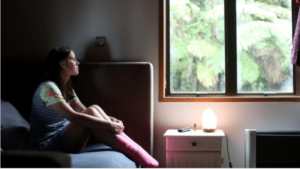October 9, 2016
Auckland woman Kim Girbin reported stomach pains to her GP for three years before a shock diagnosis of terminal bowel cancer in June.
The 39-year-old mother and grandmother has been given 18 months to live and has begun making funeral arrangements.
The tumour in Girbin’s bowel is so large it is inoperable and has spread to lymph nodes throughout her body.
“Everyday I wake up and I just want it to be a bad dream and go away.”
A growing number of younger Kiwis are getting bowel cancer after a late diagnosis with a colonoscopy. Some, like Girbin, only discover they have the disease once it has become a death sentence.
New Zealand has one of the highest incidences of bowel cancer in the world with more than 3000 people diagnosed and 1200 deaths from the disease each year. Rectal bleeding and changes in bowel habits for longer than six weeks are the key symptoms that may be a sign of bowel cancer according to the Ministry of Health.
The otherwise fit and healthy retail marketer said she reported persistent, random “stabbing” stomach pains to her GP for three years but was not referred for a colonoscopy until this year when the symptoms continued to worsen.
At times she was forced to pull off the highway while driving, crippled over with pain.
“[The GP] kept saying it was womanly issues or as you get older you get pains and I was like well, I know my body, my body doesn’t just get pains and this is weird.”
Told it would take three to four months for a colonoscopy in the public system Girbin paid $2000 to have it done privately and in June she received the devastating diagnosis.
In December last year she paid for an ultrasound privately but the company scanned her pelvic area and not her stomach.
“I couldn’t understand why the bowel cancer didn’t show up on the ultrasound and I’ve just found out they just did the pelvic area and not the stomach which is what I paid and asked for.”
Girbin said she would have pushed to get a colonoscopy earlier if she had known what the symptoms could mean.
“If it can happen to me – the fittest, healthiest person – then it can happen to anyone.”
I just want to say to people ….be aware of your body and if something isn’t right go to the doctor and don’t accept that this is what happens.”
Click here to read the full story.



